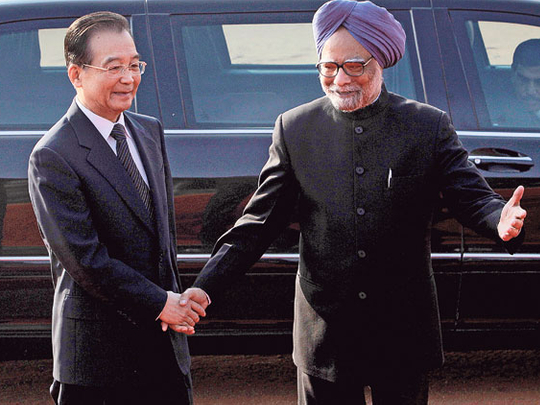
New Delhi: Rejecting any rivalry between them as they become emerging powers on the global stage, India and China on Thursday agreed to address contentious issues that have been a source of bilateral friction.
They also set an ambitious trade target of $100 (Dh367) billion by 2015 and said that when the two Asian giants speak in one voice, "the world listens".
Prime Minister Manmohan Singh and his visiting Chinese counterpart Wen Jiabao held talks to forge "strategic consensus" on a range of issues, including the problem of stapled visas for residents of India's Jammu and Kashmir, the widening trade deficit, global terrorism, nuclear non-proliferation and climate change.
After their talks lasting an hour and a half at the Hyderabad House, the two leaders agreed that there was "enough space in the world for the development of both India and China and enough areas for both to cooperate".
They welcomed the launch of a hotline between the prime ministers, that became operational four days ago, as an important step to build trust and expand cooperation on critical global issues needing urgent consultations.
"Our relationship has transcended the bilateral dimension and has assumed global and strategic significance," Manmohan Singh said while toasting the Chinese premier at a banquet he hosted in his honour.
"The growing inter-dependence of nations provides both the opportunity and the obligation for India and China to cooperate together to meet the challenges facing the international community," he said. "The fact is that when India and China, representing more than two and half billion people speak in one voice, the world listens."
The two sides signed six pacts in areas ranging from media and cultural exchanges to green technologies, the sharing of hydrological data on the Sutlej river and collaboration between their banks.
Taking a long-range view of their relationship, New Delhi and Beijing focused on economic diplomacy to offset divergences on contentious issues.
India has expressed displeasure at China virtually questioning Indian sovereignty over Kashmir by giving stapled visas to residents of the state seeking to visit that country and China's accelerated investment in Pakistan-controlled Kashmir that New Delhi sees as a strategic threat.












